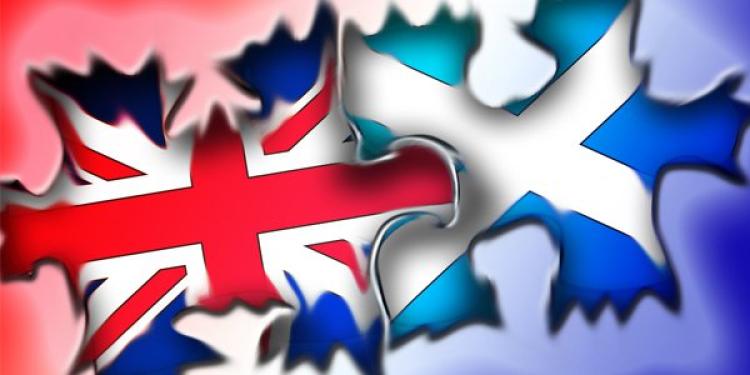Scotland & The UK – A Little Bit Of History…
Posted: September 17, 2014
Updated: June 4, 2017

The relationship between Scotland and the rest of the UK has been at times both hostile and hospitable but could that union be coming to an end?
The United Kingdom is a political and economic union of four countries, England, Scotland, Wales and Northern Ireland, that is run from the parliament in Westminster, London, capital of England. It is an historical bonding of nations that sees the English in dominance over the others due to its larger population, economy and military. The red cross of St. George is laid over the others on the Union Jack flag, and the authorities in London hold the purse strings, have their fingers on the nuclear trigger, and are generally still very much in charge.
Three Hundred Years Together
• Act of Union signed in 1707
• Bribery and threats used to gain acquiescence
• Scotland in no real position to refuse
So when Scotland decided to hold a referendum on leaving the United Kingdom they were in essence holding a vote on leaving England, and English control. It is entirely fair to say that Scotland and England have a bit of a history, well alright, then a lot of history and not all of it very pleasant. Several wars and numerous royal shenanigans had left the Scots mistrustful of the English, but more than willing to emulate their empire building as a way of making Scotland a world trading power. It was to be their undoing.
In what, with hindsight, can be easily recognized as sheer folly the Scots decided that what they really needed was a colony and to that end the Darien Scheme, the setting up of a Scottish colony on the Isthmus of Panama on the Gulf of Darien, was entered into in the late 1690s. From the outset the entire enterprise was hampered by bad planning, poor provisioning, a lack of good leadership and, perhaps most importantly, a complete lack of demand for trade goods.
Disease and food shortages ravaged the colony itself which was finally abandoned in 1700 after a small Spanish force put it under siege. Although this manner of end to the colony is disputed, the result was the same, complete failure. This was not only a devastating blow to national pride but a massive blow to the national purse with the scheme having been backed by between 25% and 50% of all the money in circulation in Scotland at the time. Gambling news from the colony would be good many Scots nobles were bankrupted by its downfall.
Colony Failure Ruined Scottish Economy
It might be unfair to say England took advantage of their misfortune, but that is precisely what happened with English money dangled before impoverished Scots nobles. In 1705 both Scottish and English parliaments agreed to enter into negotiations for a union twixt the two, sending 31 commissioners each. The division between those for and against the union crossed over the ranks of both teams with what was known as the “Country Party” being against it and the “Court Party” being for the union of the two nations.
The negotiations led to the Act of Union in 1707 that officially signed control of Scotland to England, but had more than a passing dalliance with bribery and corruption along the way. The massive funds at the disposal of the Duke of Queensberry had left the opposition with little support and the economic situation in Scotland had become dire. They needed England, and England was all too willing to spend a lot and make vaguely veiled threats to gain Scotland.
Whilst the Act of Union did indeed stabilize the Scottish economy which was in real danger of entering free fall, the controversy it created was to be as solid. Mistrust between those who had directly benefited and those who had not created rifts in Scottish society whilst the English themselves began imposing laws upon Scotland with which the Scots were not happy. Perhaps the worst of these occasions was the 1746 banning of the kilt, the traditional male wear of the Scots, which perhaps set in stone the tone of the relationship.
In the three hundred years since the Act of Union Scotland has not been able to run its own affairs and as the growing Scottish National Party gained more support the UK government sought to head off the independence argument with devolved powers and a semi-autonomous Scottish parliament. Unfortunately this merely meant that Scotland could make law for itself so long as the UK didn’t mind, and if it did the UK could amend it or merely scrap it like an online casino in the UK suddenly changing its terms and conditions without notice.
Modern Independence Movement Has Grassroots Support
The rise of Alex Salmond and the SNP was the political surprise of recent years with their win at the 2011 polls sealing their control over the Scottish parliament which then promptly called for a referendum on independence (a major plank in their platform). Of course the UK government had to approve the referendum and there was a wholesale refusal to do so as the Scots wanted three options. Full independence, remaining within the union and far, far greater devolved powers.
The UK government insisted on a straight “Yes” or “No” vote feeling that the Scots wouldn’t gamble on a future alone and thus the Union would be preserved. With no choice Alex Salmond agreed and set himself about climbing the mountain that the English had placed before him, working slowly but surely to build up a grassroots campaign that has grown to include a whole raft of groups and campaigners who have united to fight for Scottish rule over Scotland.
As the poll numbers began to close to the point where the referendum result became “too close to call” and online gambling sites in the UK offered almost even odds between the two sides, the Westminster politicians realized their complacency had been misplaced and that there was a real chance that 300 years after signing up to union with England, the Scots might vote to leave. Unwilling to give up on a tactic that once worked before the politicians of Westminster first attempted to frighten the Scots with dire predictions, then when that failed to turn the tide sufficiently, they turned to bribery.
The three major party leaders in London have pledged together to deliver even more devolution to Scotland, although the details of precisely what they mean are still shaky, in what has been widely seen as a rather desperate and clawing attempt to muddy the waters in which Mr. Salmond has been swimming, The Act of Union 300 years ago was obtained by hook or by crook and now it would be saved pretty much the same way. On Thursday Scotland decides and like footballers poker players and prostitutes after a hard night’s work Scotland will awake Friday sore from the campaign whatever the result.











